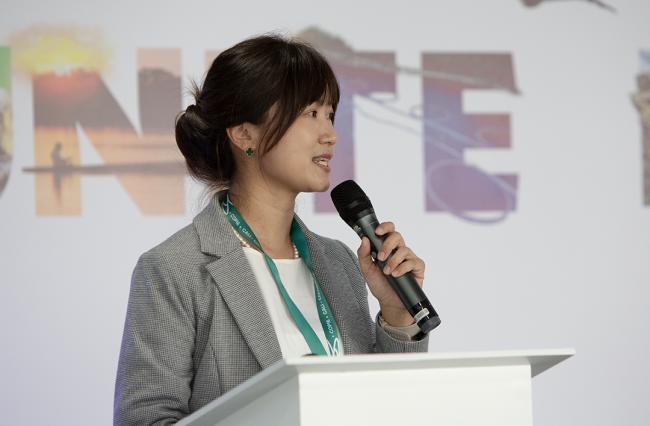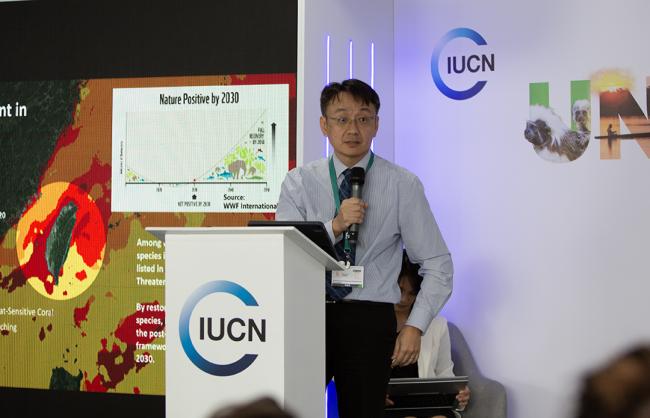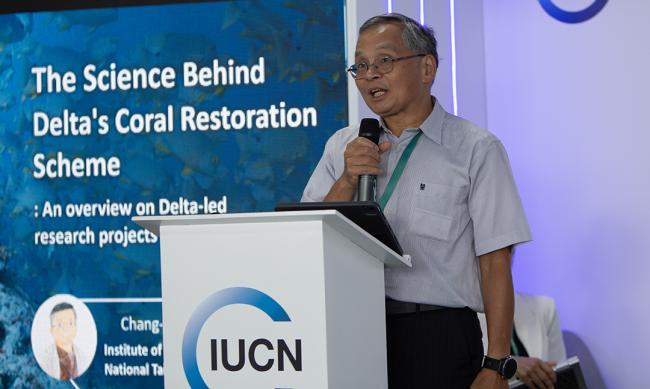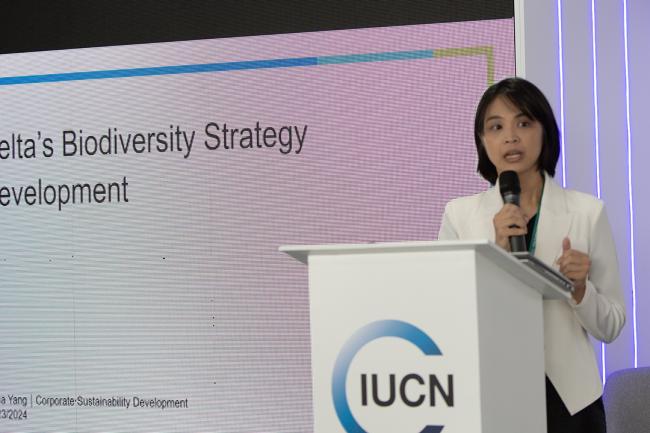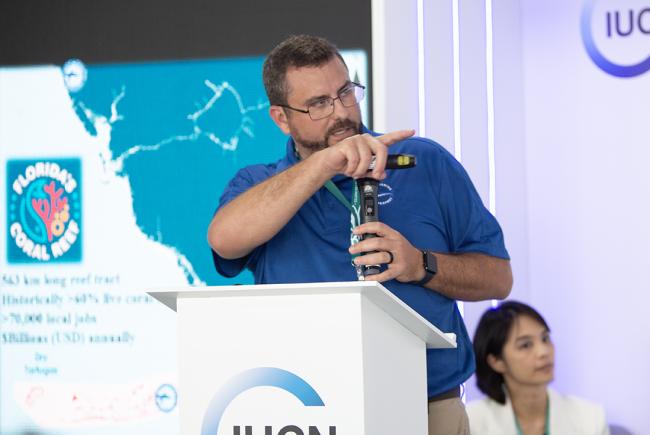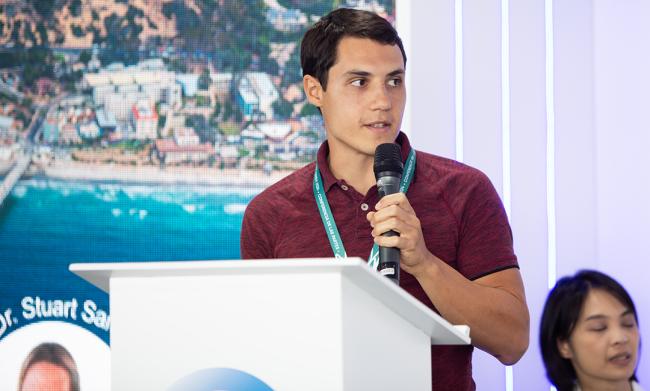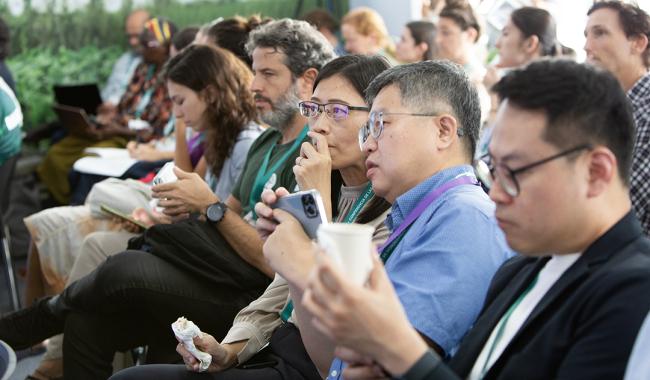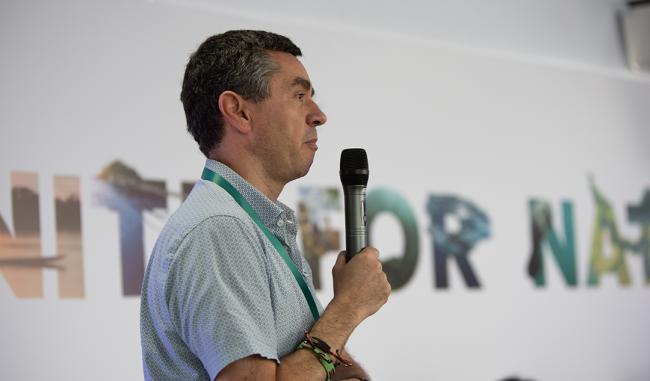About
Achieving the goals and targets of the Kunming-Montreal Global Biodiversity Framework (GBF) will require multi-stakeholder engagement and creative solutions. Focusing on coral reef conservation and restoration, presenters during this event explored the role of multi-sectoral partnerships in leveraging science and technology to reduce biodiversity loss and foster resilient ecosystems, while making data, technology, and research capacity easily shareable and accessible to all interested stakeholders.
Mona Yang, ESG Manager, Delta Electronics, began with an overview of the important role private businesses can play in advancing climate change and biodiversity action. She gave examples of her company’s work with partners and initiatives, including: We Mean Business; Taskforce on Nature-Related Financial Disclosures; Science-Based Targets Initiative; RE100; and EV100, which aims to make EVs the norm by 2030 to achieve net zero. She said these examples underscore steps taken to establish science-based targets that contribute to achieving the vision of “living in harmony with nature” as outlined by the GBF.
Wim Chang, CEO, Delta Electronics Foundation, shared a series of advancements in coral reef research and collaborations among scientists and engineers. He highlighted investment in technologies that have advanced knowledge on heat-resilient coral reefs, including: testing in spawning corals; crossbreeding coral species that can survive in warmer regions with those that survive in colder areas; and using MicroCT systems that allow researchers to better identify coral species.
Chang-Feng Dai, Institute of Oceanography, National Taiwan University, spoke on the impact of climate change, saying he has seen a noticeable reduction in species diversity since the 1970s. He highlighted the importance of business and academia working together in a science-based approach to coral conservation and restoration. He shared examples of research on: the heat adaptability of coral species; sexual and asexual reproduction of coral species under various environmental conditions; survival and growth rates under different testing conditions; and shocking mechanisms and common stressors. He reported that coral restoration success depends highly on coral taxa, and that stakeholders should continue to explore the potential for data, technology, and information sharing.
Jason Spadaro, Scientist Staff and Program Manager, Mote Marine Laboratory & Aquarium, highlighted a dramatic shift in coral cover along the Florida coast in the US, from a historical level of 60% to less than 2%. He shared Mote’s coral restoration efforts, which include four offshore coral nurseries and three land-based coral nursery production facilities, growing 21 different species. He said for an operation of that scale, the use of technology in partnership with Sea Foundry was key in promoting a “dramatic improvement” in operational efficiency. He also said technology has enabled researchers to take a community approach to coral restoration and move away from monocultures. Spadaro provided examples of the importance of engaging community and local stakeholders to bring coral restoration to scale.
Orion McCarthy, Scripps Institution of Oceanography, University of California San Diego, shared his research on coral reef change over time. His key message was that local context and local environmental conditions matter for coral resilience. He stressed considering local conditions in coral management and restoration plans, and said technology has an important role to play. He pointed to 3D models as an option that allows researchers to track reef structure, individual corals, and changes over time that would be less apparent to the human eye. McCarthy highlighted the value in standardized data but also emphasized use of metrics that are locally relevant, easy to interpret, and relevant to conservation goals. He suggested that a solution to the tradeoff between standardization and the local context is to create categories of measurement that answer specific questions (e.g., whether restoration is working, whether it is providing ecosystem services), and then choosing the appropriate metrics.
A subsequent Q&A session addressed the biggest challenges to successful coral conservation and restoration, including: issues of scalability; monitoring; community engagement; controlling environmental variables in coral experiments; the complexity of multiple coral threats interaction (heat, acidification, disease); and science mobilization in advocacy and policymaking.
Organizer: DEEF
Contact: Claire Huang, DEEF claire.huang@deltaww.com
For more information:
https://tockify.com/iucnpavilion/detail/168/1729704600000
https://www.deefund.org
To receive free coverage of global environmental events delivered to your inbox, subscribe to the ENB Update newsletter.
All ENB photos are free to use with attribution. For this side event, please use: Photo by IISD/ENB | Angeles Estrada Vigil

